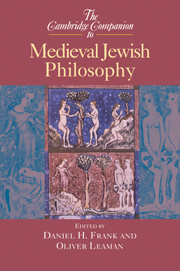Book contents
- Frontmatter
- PART I BACKGROUND AND CONTEXT
- PART II IDEAS, WORKS, AND WRITERS
- 4 Saadya and Jewish kalam
- 5 Jewish Neoplatonism
- 6 Judah Halevi and his use of philosophy in the Kuzari
- 7 Maimonides and medieval Jewish Aristotelianism
- 8 Maimonides and the sciences
- 9 Medieval Jewish political thought
- 10 Judaism and Sufism
- 11 Philosophy and kabbalah
- 12 Arabic into Hebrew
- 13 Philosophy in southern France
- 14 Conservative tendencies in Gersonides’ religious philosophy
- PART III THE LATER YEARS
- Guide to further reading in English
- Index
9 - Medieval Jewish political thought
from PART II - IDEAS, WORKS, AND WRITERS
Published online by Cambridge University Press: 28 May 2006
- Frontmatter
- PART I BACKGROUND AND CONTEXT
- PART II IDEAS, WORKS, AND WRITERS
- 4 Saadya and Jewish kalam
- 5 Jewish Neoplatonism
- 6 Judah Halevi and his use of philosophy in the Kuzari
- 7 Maimonides and medieval Jewish Aristotelianism
- 8 Maimonides and the sciences
- 9 Medieval Jewish political thought
- 10 Judaism and Sufism
- 11 Philosophy and kabbalah
- 12 Arabic into Hebrew
- 13 Philosophy in southern France
- 14 Conservative tendencies in Gersonides’ religious philosophy
- PART III THE LATER YEARS
- Guide to further reading in English
- Index
Summary
Politics is the art (techne) of human government. Political science, in its classical sense, is the body of knowledge informing the practice of this art. According to Maimonides, in his Treatise on the Art of Logic, political science “falls into four parts: first, the individual's governance of himself; second, the governance of the household; third, the governance of the city; and fourth, the governance of the large nation or of the nations.” Governance of the city has traditionally been the axial political activity. It is from the city, the polis, that the art receives its name: politics. Indeed, “governance of the city is a science that imparts to its citizens knowledge of true happiness and imparts to them the [way of] striving to achieve it.” The science of the governance of the city furthermore prescribes for the citizens “the rules of justice that order their associations properly.” The comprehensive quality of the city determines the specific shape of individual ethics and household management. The government of an empire is an amplification of the basic comprehensive unit, the city.
Maimonides’ definition of political science raises important questions. Medieval Jews did not have a city (or state) of their own, and although the Jews are a nation, they were dispersed among many nations; they lacked sovereignty and a specific territory of their own. Is there any significance to a discussion of politics for a people in exile?
- Type
- Chapter
- Information
- The Cambridge Companion to Medieval Jewish Philosophy , pp. 176 - 200Publisher: Cambridge University PressPrint publication year: 2003
- 3
- Cited by



